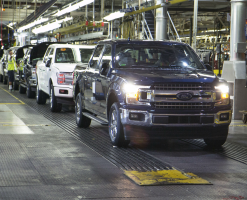
— A Ford F-150 brake failure lawsuit will continue after a federal judge dismissed most of the allegations that Ford trucks are equipped with defective brake master cylinders.
The Ford F-150 brake failure class action lawsuit was filed in 2018 after plaintiffs complained about 2013-2018 F-150 master cylinders that leaked brake fluid. The loss of brake fluid allegedly causes brake failures suddenly and without warning, something Ford allegedly has long known about.
According to the lawsuit, the Ford 2013-2018 F-150s contain Hitachi master cylinders that use single cup seal pistons to hold the pressurized brake fluid. The plaintiffs claim the master cylinder pistons need two cup seals to prevent brake fluid from leaking and causing brake failures.
In July 2019, the judge dismissed most of the brake failure claims, including all of the plaintiffs’ express and implied warranty of merchantability claims, unjust enrichment claims and claims under the Magnuson-Moss Warranty Act (MMWA).
However, the plaintiffs amended their lawsuit by adding more plaintiffs from more states and repleaded certain claims.
The judge went down a list of allegations starting with express warranty claims, finding the plaintiffs didn't allege they experienced any problems once the master cylinders were replaced by Ford.
Bringing on new plaintiffs in the amended suit did no good with implied warranty of merchantability claims. Those claims failed because the lawsuit "lacks factual allegations that the alleged master cylinder defect renders their vehicles unmerchantable."
"This Court previously held that, where a plaintiff 'does not allege his [or her] vehicle cannot brake nor that he [or she] is unable to use his vehicle,' any 'implied warranty claims fail for this reason.'” - Judge Gershwin A. Drain
According to the judge, the new plaintiffs never allege their trucks cannot brake or be driven.
The judge also dismissed an Illinois implied warranty claim because the driver claimed the truck was dangerous to drive, but “his actions belie[d]” that allegation because he continued to drive the truck.
“The weight of authority, from courts across the country, indicates that plaintiffs may not recover for breach of the implied warranty of mercantability . . . where plaintiffs have driven their cars without problems for years.”
Additional implied warranty claims in two states also fail because privity between the buyer and seller of a vehicle is required under state laws. The plaintiffs purchased their F-150s from Ford dealerships, but not directly from Ford.
The judge also ruled all Magnuson Moss Warranty Act claims failed because the plaintiffs failed to allege any viable warranty claims.
The plaintiffs did have success concerning Ford having knowledge of a possible defect in the F-150 master cylinders.
The automaker alleges internal documents prove the earliest Ford was aware of a problem was in June 2015. But the plaintiffs claim Ford must have known before 2015 based on repair data, customer complaints, input from dealerships and other sources.
The judge agreed with the plaintiffs and ruled Ford "is not entitled to dismissal of these fraud-based claims based on a failure to allege Ford’s pre-suit knowledge of the master cylinder defect."
The Ford F-150 brake failure lawsuit was filed in the U.S. District Court for the Eastern District of Michigan: Weidman et al., v. Ford Motor Company.
The plaintiffs are represented by the Miller Law Firm, P.C., Beasley, Allen, Crow, Methvin, Portis & Miles, P.C., and DiCello Levitt & Casey.
CarComplaints.com has brake complaints about F-150 trucks:




